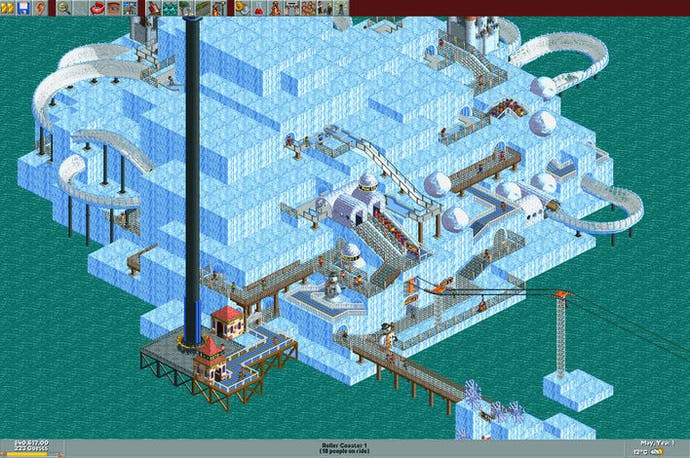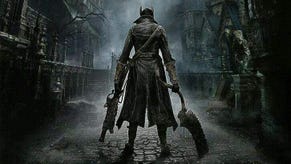Retrospective: RollerCoaster Tycoon
Ups and downs.
If the months I spent playing RollerCoaster Tycoon taught me anything, it's that the general public are idiots.
Make a path a little bit too wide and they'll stop, scratching their heads with confusion. They'll potter a couple of steps to the left, then to the right. Then they'll proclaim that they're lost and that they want to go home.
Or maybe you've created a nice, pleasant area filled with eating establishments. There's a burger van, a pizza place, somewhere to get an ice-cream and a stall selling candyfloss. Mr. Idiot General Public will stand around for a while, then wander up to the chip shop, angrily protesting: 'I don't want to buy any chips!' as his happiness rating begins to plummet.
Most alarming, though, is their haphazard attitude to theme park safety. If there's been a bit of an accident on a ride, no one will ever go near it again, even after you've painstakingly fixed the problem and any variations of it you could possibly envision. However, build a rollercoaster with an enormous gap in the track and punters will queue up round the block, merrily trotting on towards certain doom. 'I've never seen a roller-coaster like that before,' the fools are probably thinking. 'Sounds like fun!'
Then again, that's sort of the best bit.
RollerCoaster Tycoon is an enormous, intricate management sim from Chris Sawyer - master of the Tycoon games - in which you take control of a variety of theme parks and try to earn yourself a ludicrous sum of money. There are reams of variables to consider, there's plenty of research and development to partake in, and there are crowds of horrible members of the public to appease. But, for me, at the absolute centre of RollerCoaster Tycoon's appeal was the joy of exploiting its many little quirks.
The first time you build a horrifically unsafe ride, it's probably been by accident. You were too eager to open it to the public, perhaps, so you didn't bother sending a train round in test mode first. You didn't realise that you'd forgotten to join those two sections of track, or that it was possible for a train to get stuck on a hill, roll back down the way it came, and smash into the front of the one hurtling down the last drop. And you look on in horror as those screams of ecstasy become ones of mortal terror, before falling silent, a mass of smoke and flames billowing in the place where 32 happy lives used to be.

But after a few of these mishaps, you realise it's quite funny. So you start to plan for them. You remove that section of the track quite deliberately. You construct that hill so that the train will reach its peak, almost pull itself over the top, then slowly roll backwards towards its fate. You remove a segment of path in a busy area and watch any nearby guests starve to death, because you know these people are utterly unwilling to walk across the grass.
You make the launched freefall ride - an enormous tower that blasts its passengers skywards - a little bit too short for the speed at which it travels. You watch the car fly through the sky, tumble downwards, and splash into the lake where people were riding pedalos without a care in the world until you came along and ruined everything.
RollerCoaster Tycoon is a game with a marvellous, twisted sense of humour. It knows it's ridiculous. It knows you can bounce off its foibles to wreak havoc in a hundred different ways. And it's fine with that. It would have been easy for the game to prevent you from picking up a smiling family and dropping them into a mass of water, for example. But it doesn't. Instead, the game simply pops up a notification informing you that, sadly, a few of your guests have drowned.
These memories have been etched into my mind forever, I'm sure. But returning to RollerCoaster Tycoon recently, two other things particularly interested me.







